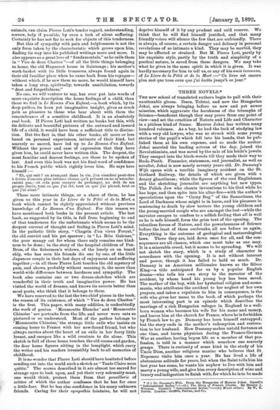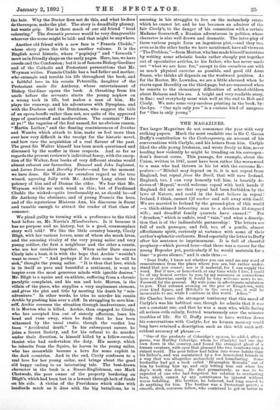THREE NOVELS.*
THE new school of translated authors begin to pall with their unutterable gloom. Ibsen, Tolstoi, and now the Hungarian Jokai, are always bringing before us new and yet newer miseries, which aggravate the harshness of the triumphs of Science—beneficent though they may prove from one point of view—and set the cruelties of Nature and Life and Character in a pitiless kind of frame. Maurus Jokai has written many hundred volumes. As a boy, he had the luck of studying law with a very old lawyer, who was so struck with some young stories of the pupil's which fell into his hands, that he pub- lished them at his own expense, and so made the author. Jokai married the leading actress of the day, joined the Revolutionists, and was saved by the sale of his bride's jewels. They escaped into the birch-woods till they made their way to Buda-Pesth. Financier, statesman, and journalist, as well as novelist, Jokai is now nearly seventy years old. Dr. Dumany's Wife opens with a terrible imaginary accident on the St. Gothard Railway, the details of which are given with a dreary ghastliness ; while the figures of the cool Englishman and the sketching journalist are anything but new types. The Polish Jew who chants invocations to his God while he has hope, and then spits into his altar-fire—with the author's speculations upon the " Czrny Bog" of the Samaritans, the Lord of Darkness whose might is in harm, and his pleasure in sentencing to death by slow torture the young children and the young married couple who are amongst the lost—while the narrator escapes to confess to a selfish feeling that all is well as he is safe himself, form the grim text of the opening. The relentless forces of Nature, and the powerlessness of Science before the least of these outbreaks, all are before us again. Everything is the outcome of geological and meteorological laws. There they are, laid down once for all, and the con- sequences are all chance, which one must take as one may. It is a miserable creed, but it seems to be spreading. We will not sketch the story, which is a study of character in accordance with the opening. It is not without interest and power, though it has failed to hold us much. Dr. Dumany is an American millionaire known as the Silver King—a title anticipated for us by a popular English drama—who tells his own story to the narrator of the accident, by whose hand his young boy has been saved. The mother of the boy, with her hysterical religion and mono- mania, who attributes the accident to her neglect of her own prayers, and takes a repulsion to him in consequence, is the wife who gives her name to the book, of which perhaps the most interesting part is an episode which describes the marriage of a rich Hungarian refugee in England to a well- born woman who becomes his wife for his name and money, and leaves him at the church for France, where he is forbidden by French law to go. Dumany has been himself entrapped; but the story ends in the mother's redemption and restora- tion to her husband. How Dumany makes untold fortunes at one time, and turns physician during the Franco-German War at another, having begun life as a member of that pro- fession, is told in a manner which somehow one scarcely grasps. There is curiosity of some kind in the study of his Uncle Dion, another religious maniac who believes that St. Nepomuc visits him once a year. He has lived a life of abstemious solitude for years, but when the Saint tells him his last year has come, he wants his nephew to live with him and marry a young wife, and give him every description of wine and luxury and indigestion to finish with, for which he is to be made • (1) Dr. Duinanrs Wife. From the Hungarian of Manus Jokai. Cassell's "International Series."—(2.) The Story of Francis Chade. By Stanley .1. Weyman. Cassell's " International Series."—(3.) Misadventure. By W. H. Norris. London: Griffith, Farran, and Cc. the heir. Why the Doctor does not do this, and what be does dothereupon, make the plot. The story is dreadfully gloomy, but wants grip. Nor is there much of our old friend " local colouring." The dramatis persona would be very disagreeable wherever the scene might be laid: and that might be anywhere.
Another old friend with a new face is " Francis Cludde," whose story gives the title to another volume. It is the English novel historic, where " popinjay" and " forsooth " meet us in friendly shape on the early pages. Here, too, we have creeds and the Confession; but it is of famous Bishop Gardiner and of the Catholic and Protestant persecutions that Mr. Weyman writes. Francis Cludde has a bad father and mother, who entangle and trouble his life throughout the book, and a faithful love in his cousin Petrouilla, daughter of the Protestant uncle Sir Anthony, whose entertainment of Bishop Gardiner opens the book. A thrashing from his uncle before the servants starts the young nephew on a wrong tack in life, but makes a man of him. He plays the runaway, and his adventures with Dymphna, and with the Duchess and the Dutchman, who suggest the title of an opera-bouffe rather than not, are quite of the approved type of quarterstaff and mediasvalism. The constant " Have at ye !" the vagaries of the fool named, for no obvious reason, "Martin Luther," and the floating reminiscences of Ivanhoe and Wamba which attach to him, make us feel more than ever how very difficult is the receipt for the historic novel, and how rare the acquisition of a real flavour of the past. The great Sir Walter himself has been much questioned and discussed by the scoffer in these respects. And so far as regards the present reviewer's individual fancy, with the excep- tion of Sir Walter, four books of very different strains would almost exhaust our favourites. Esmond and John Inglesant, and Lorna Doane and Dorothy Forster—and for the moment we have done. Sir Walter we ourselves regard as the true wizard, agreeing fully with Mr. Andrew Lang about the potency of him and of Damas the elder. We fear that Mr. Weyman wields no such wand as this ; but of Ferdinand Cludde the wicked—quite irredeemably so, as should be—of Sir Anthony the obstinate, and of young Francis the hero, and of the mysterious Mistress Ann, his discourse is fluent and tunable enough to attract the reader of that class of romance.
We plead guilty to turning with a preference to the third book before us, Mr. Norris's Misadventure. Is it because it has no purpose and no history, but is a good, commonplace story well told? We like the little country beauty, Cicely Bligh, with her various lovers, none of, whom she much loves, and the amusing rivalry of the very young sailor and very young soldier, the first a neighbour and the other a cousin, who are her cavaliers together. When sailor Dare coaxes Cicely into a boat, it is with the hope that Archie "wouldn't want to come." " And perhaps if he does come he will be sick," thought the young sailor. " It is thus that love, which is in itself so pure and beautiful a sentiment, is wont to inspire even the most generous minds with ignoble desires." Mr. Bligh is a squire and ex-athlete, suffering from a chronic paralytic complaint, and his son and heir, Morton, is the villain of the piece, who supplies a very unpleasant element, and gives the plot and title by meeting his death by " mis- adventure." In other words, he tries to murder his cousin Archie by pushing him over a cliff. In struggling to save him- self, Archie reverses the situation through inadvertence, and it is Morton who is killed. Archie, then engaged to Cicely, who has accepted him out of sisterly affection, loses his head and runs away, when he finds that he has been witnessed by the usual rustic, though the verdict has been " Accidental death." In his subsequent career, he joins a Secret Society, and for his refusal to do murder under their direction, is himself killed by a fellow-revola- tionist who had undertaken the duty. His money, which he inherits from the Squire, he leaves to the young sailor, who has meanwhile become a hero for some exploit in the dark countries. And in the end, Cicely confesses to a real love for her young sailor, and brings about the good old happy ending to an interesting tale. The best-drawn character in the book is a Russo-Englishman, one Mark Chetwode, the poor owner of the property bordering on Bligh's, which had been lost in a lawsuit through lack of funds on his side. A victim of the Providence which sides with landlords much as it does with the big battalions, he is
amusing in his straggles to live on the melancholy estate which he cannot let, and he too becomes an admirer of the fair Cicely's, to the danger of his connection with a certain Madame Souravieff, a Russian adventuress in politics, whose character is also well drawn and dramatic. The inter-play of these various people form an ingenious plot,—and they too, even as in the other books we have mentioned, have all views on "The Problem,"—from Morton, who has made himself notorious by writing some atheistic books rather cheaply put together out of speculative articles, to his father, who has never made out "what we are here for," except to tire ourselves out with as much physical exercise as possible, and good old Aunt Susan, who thinks all depends on the westward position. As for the Rector, Mr. Lowndes, we are a little alarmed when he starts upon Heredity on the third page, but are reassured when he resorts to the elementary difficulties of school-children about Balaam and his ass. A bright and very readable story, in fine ; and everybody must wish well at the end to Bob and Cicely. We note some very careless printing in the book, by- the-bye. " One ngis only you " is a curious kind of anagram for " One is only young."















































 Previous page
Previous page